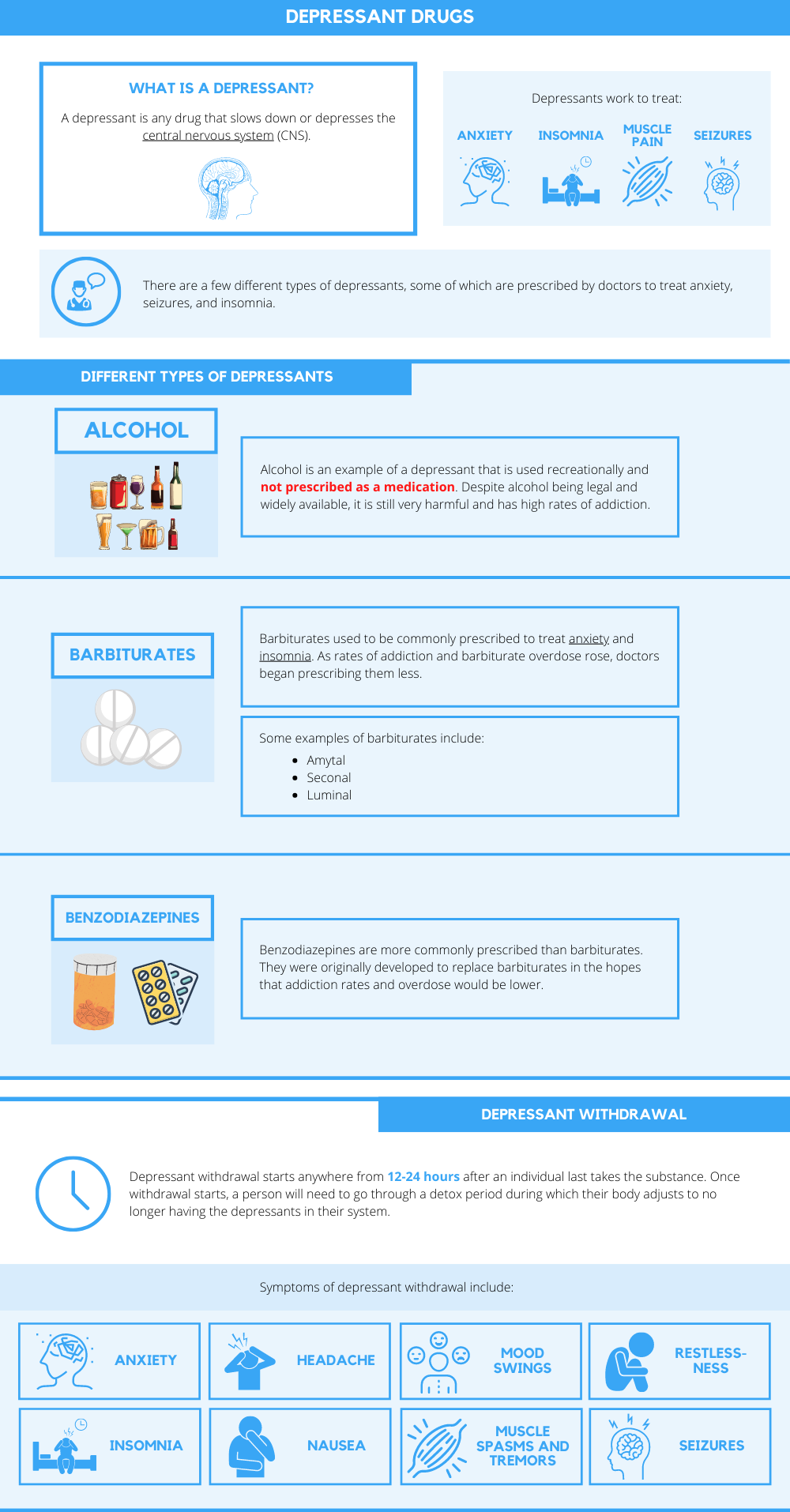The term “depressant drugs” may cause people to think these substances are associated with depression. However, it instead refers to how the drugs act in the body and, more importantly, in the brain. Depressants work by depressing the central nervous system, which includes the brain and surrounding nerves.
Many depressants are addictive and can wreak havoc in people’s lives. Understanding more about what depressant drugs are and why they are dangerous is one of the first steps in helping a struggling loved one overcome addiction.
What is a Depressant?
A depressant is any drug that slows down or depresses the central nervous system (CNS). Depressants work to reduce anxiety, help a person sleep, relax muscles, and prevent seizures.[1] There are a few different types of depressants, some of which are prescribed by doctors to treat anxiety, seizures, and insomnia.
Alcohol
Alcohol is an example of a depressant that is used recreationally and not prescribed as a medication. Despite alcohol being legal and widely available, it is still very harmful and has high rates of addiction.
While alcohol is a social substance, people regularly become dependent on it without even realizing it. Excessively using alcohol and engaging in activities like binge drinking puts people at a significantly higher risk of developing alcoholism.[2]
Barbiturates
Barbiturates used to be commonly prescribed to treat anxiety and insomnia. As rates of addiction and barbiturate overdose rose, doctors began prescribing them less. Their medical use is now for anesthesia and preventing seizures, however, people still abuse barbiturates recreationally.
Barbiturates depress the CNS and slow down functions in the body including respiratory rates. In the case of a barbiturate overdose, bodily functions slow down to dangerous levels and may result in coma or even death.
Some examples of barbiturates include:
- Amytal
- Seconal
- Luminal
Benzodiazepines
Benzodiazepines are more commonly prescribed than barbiturates. They were originally developed to replace barbiturates in the hopes that addiction rates and overdose would be lower.[1] However, that was not the case and benzodiazepine addiction is now a major problem for many people.
Benzodiazepines include Xanax, Valium, and Ativan. They are usually prescribed to treat anxiety and panic disorders. However, even individuals taking benzos as prescribed by their doctor are still at risk of developing dependence and addiction to the drugs. And, since benzodiazepines are so widely available, the rates of abuse are very high.[3]
How Do Depressant Drugs Work?
Depressants act on chemicals in the brain known as neurotransmitters. These neurotransmitters are the “feel-good” chemicals in the body that increase muscle relaxation, reduce anxiety, and produce an overall calming effect.
As a person continues to take depressant drugs, whether prescription or recreationally, their body becomes used to having the drug increase these feel-good hormones. They eventually develop a tolerance. This means that they require more and more of the substance to produce the same desired effect. In cases of prolonged use (anything longer than 3 weeks), people will likely experience withdrawal symptoms when attempting to stop the drugs.[4]
Depressant Withdrawal
Depressant withdrawal starts anywhere from 12-24 hours after an individual last takes the substance. Once withdrawal starts, a person will need to go through a detox period during which their body adjusts to no longer having the depressants in their system.
Symptoms of depressant withdrawal include:
- Headaches
- Anxiety
- Mood swings
- Restlessness
- Insomnia
- Muscle spasms and tremors
- Nausea
- Seizures
The symptoms and side effects of depressant withdrawal are very uncomfortable. Some people may even have dangerous complications during detox. Sometimes, individuals attempt to self-detox at home. However, this can be dangerous due to the serious side effects and potential complications of withdrawal. It is advisable to undergo detox with the supervision of a licensed healthcare professional.
Depressant Detox
Detox under the supervision of a healthcare provider is done as either outpatient or inpatient. Choosing a detox program depends on an individual’s needs. People at higher risk of complications, such as seizures, require close monitoring and are recommended to enter inpatient detox.
During detox, a doctor will usually prescribe a taper of a benzodiazepine to reduce the side effects of withdrawal. This limits discomfort during detox making it a more bearable experience.
Getting Help for Depressant Addiction
Whether you are struggling with alcohol, benzos, or barbiturates, it is important to seek help for an addiction to depressant drugs. Comprehensive Wellness Centers offers treatment programs for drug and alcohol abuse that will suit any person’s needs. Our staff will work with you closely to develop a treatment plan to help you successfully heal from your addiction.
We have excellent detox programs with medical staff on-site to monitor you throughout the process. They will ensure you are as comfortable as possible. We also have inpatient and outpatient programs to continue treatment after detox and ensure your recovery from depressant addiction is successful. Call today to start your recovery.
References:
- https://www.dea.gov/taxonomy/term/316
- https://www.niaaa.nih.gov/publications/brochures-and-fact-sheets/alcohol-facts-and-statistics
- https://www.mind.org.uk/information-support/drugs-and-treatments/sleeping-pills-and-minor-tranquillisers/about-benzodiazepines/
- https://www.ncbi.nlm.nih.gov/pmc/articles/PMC4657308/














